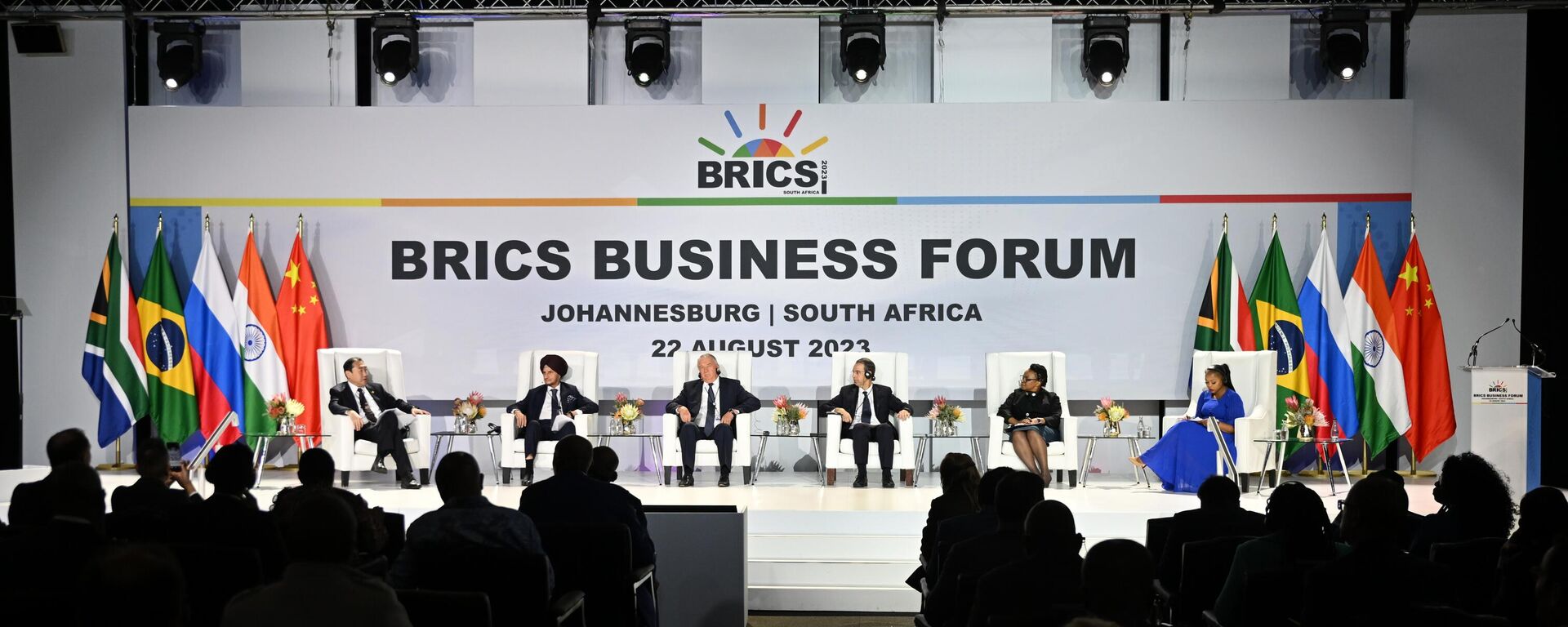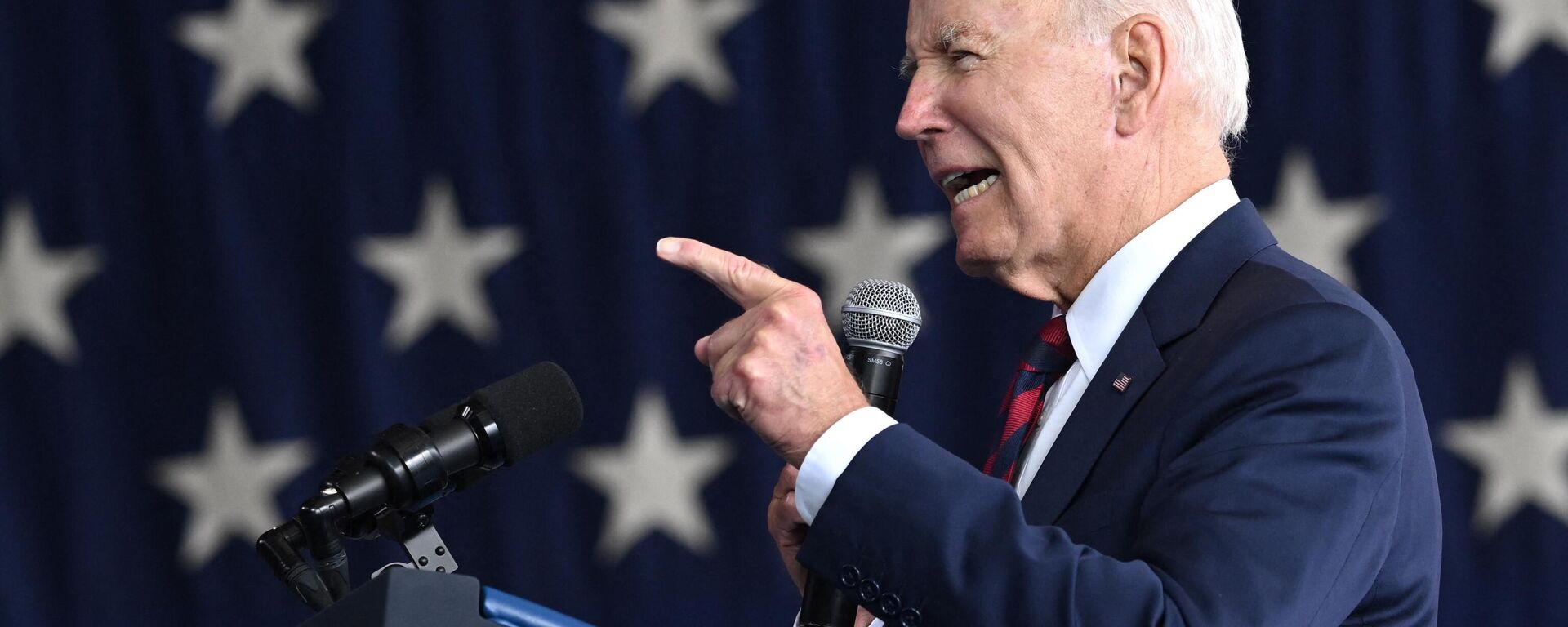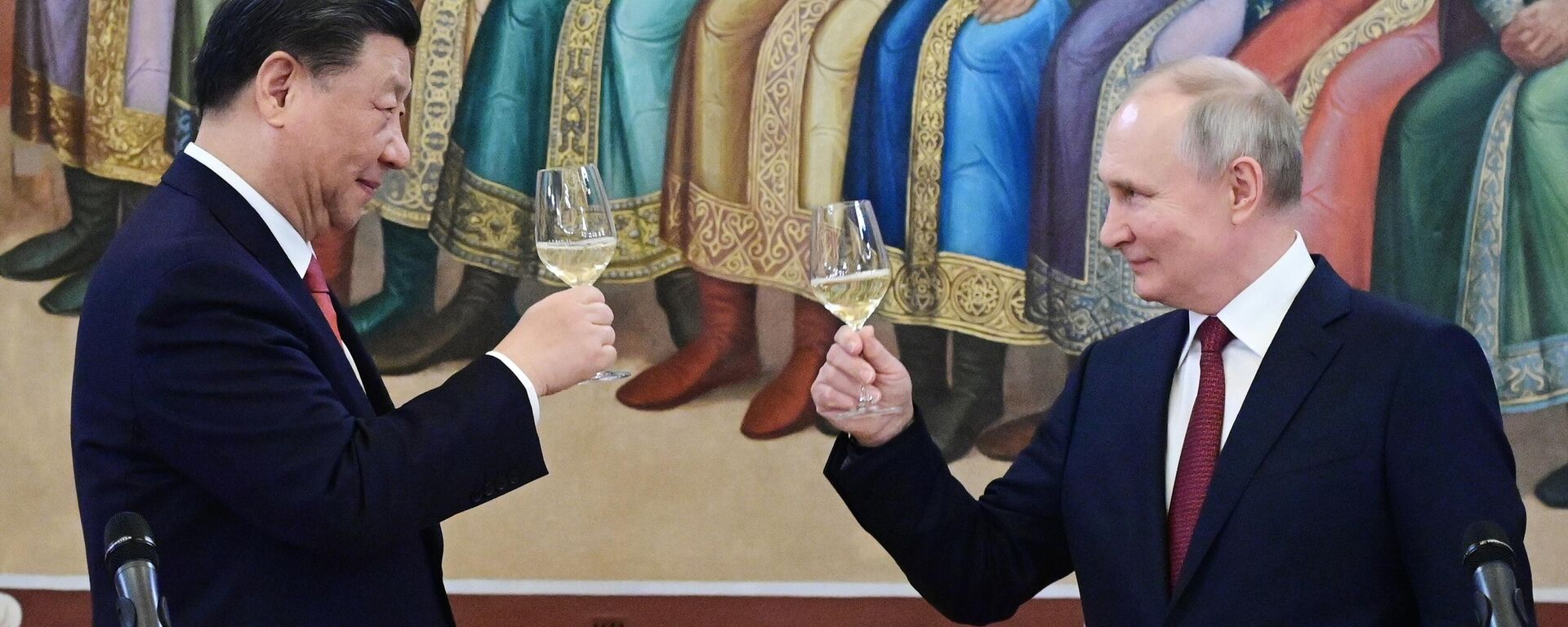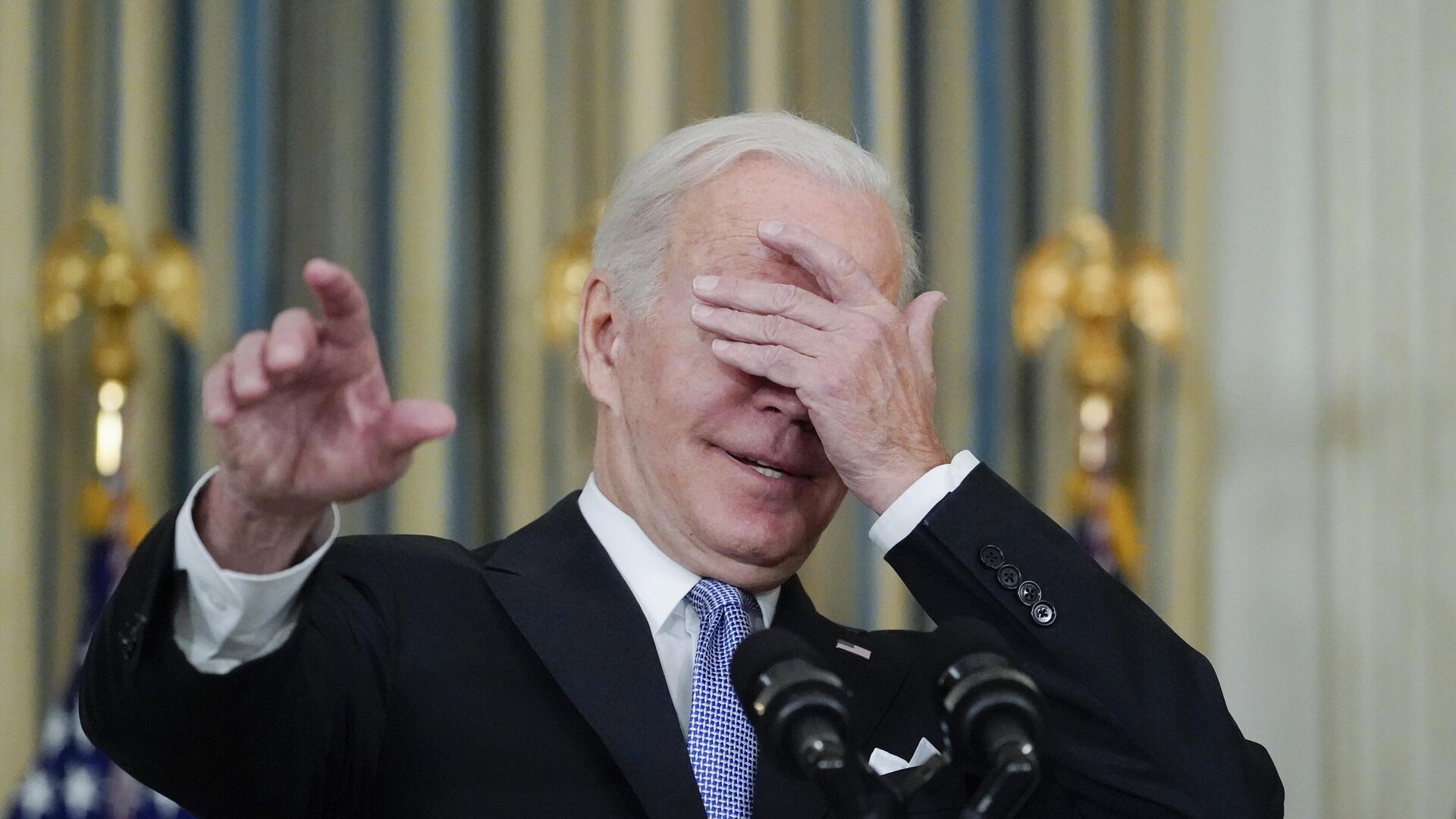https://sputnikglobe.com/20230918/cheater-in-chief-biden-wants-to-salvage-us-hegemony-by-reforming-un-security-council-1113473923.html
Cheater-in-Chief: Biden Wants to Salvage US Hegemony by Reforming UN Security Council
Cheater-in-Chief: Biden Wants to Salvage US Hegemony by Reforming UN Security Council
Sputnik International
US President Joe Biden will urge the UN to expand the Security Council to water down Russia and China's influence in the body, the Western press says. Could Biden succeed?
2023-09-18T18:42+0000
2023-09-18T18:42+0000
2023-09-18T18:42+0000
un security council (unsc)
analysis
washington
russia
china
the united nations (un)
us
europe
ww2
joe biden
https://cdn1.img.sputnikglobe.com/img/07e7/04/19/1109817311_0:0:3072:1728_1920x0_80_0_0_05f7ad3f1169e5cdf59f709903058a8c.jpg
Joe Biden "will take a look at the architecture of the Security Council," US National Security Council spokesman John Kirby announced ahead of the UN General Assembly meeting.Still, the British media assumes that the US president will advocate adding new members to the United Nations Security Council in order to weaken Russia and China's role. Reportedly, Biden wants to add India, Brazil, Germany, South Africa, and Japan to the international body.Currently, the Security Council has 15 members: five of them are "permanent" (P5) and enjoy veto powers (Russia, China, France, the UK, and the US); and 10 are "non-permanent," with five of them being elected each year by the General Assembly for a two-year term."One can surmise that Biden is joining the 'bandwagon' of many countries and academics who are similarly asking for expansion. Perhaps Biden's noises will be well received in Africa, Asia, and Latin America, where the prestige of the US has been in decline, and the US could score points at low cost," the former UN independent expert continued.Biden is by no means an innovator: at the 15th BRICS Summit, which convened in August in Johannesburg, the core nations of the group (Brazil, Russia, India, China, and South Africa) stated in their final declaration that they are in favor of reforming the UN Security Council and expanding developing countries' representation. The BRICS declaration named Brazil, India, and South Africa as potential new members of the UNSC.Thus, the US president de facto wants to add two of Washington's ardent allies to the list – Germany and Japan. The two weren't added to the original composition of the UNSC (which was formed immediately after the Second World War) since they were the two major WW2 aggressors. In addition, Team Biden seemingly wants to curry favors with major powers of the Global South in an apparent bid to drag them to Washington's side.According to Parry, "the reasons surrounding the timing of this attempt to propose changes could not be more clear, with Washington striking out virtually everywhere in proxy theaters of conflict and spheres of influence.""US hegemony is shrinking with more and more countries throughout the global south shifting away from the West toward Moscow and Beijing's camps and the Ukraine proxy war has been yet another foreign policy disaster that has geostrategically backfired," the journalist said.Per Parry, Washington's sudden interest in reforming the body looks peculiar, given that US administrations have on many occasions snubbed and abused international law by launching unilateral invasions and arranging illegal regime changes across the globe.For his part, Alfred de Zayas believes that the criticism that the composition of the Security Council is obsolete and no longer reflects the "reality on the ground" is valid. However, merely adding someone's subservient allies (like Germany and Japan) is unlikely to serve the idea of making the body more representative, he suggests."The question is how to ensure that the new permanent members are not puppets of the older permanent members," de Zayas highlighted. "Peace on our planet can best be ensured through a truly multipolar arrangement and the daily practice of multilateralism."When it comes to the use of the veto power, one should remember that it is "an important tool to prevent escalation and the use of force, allowing mediation and peace initiatives to progress," he noted. De Zayas recalled how Washington manipulated the UNSC decisions to launch its intervention in Libya, which has destabilized North Africa for decades to come, and how the US selectively used the veto power to shield its allies.Given all of the above, the Biden administration's new initiative looks highly suspicious and should be taken with a grain of salt by the international community, according to Sputnik's interlocutors.
https://sputnikglobe.com/20230825/pepe-escobar-brics-11---strategic-tour-de-force-1112882830.html
https://sputnikglobe.com/20230917/biden-to-raise-issue-of-making-amendments-to-un-security-councils-structure-says-white-house-1113442990.html
https://sputnikglobe.com/20230916/jeffrey-sachs-us-sanctions-against-russia-and-china-destined-to-fail-1113405612.html
washington
russia
china
Sputnik International
feedback@sputniknews.com
+74956456601
MIA „Rossiya Segodnya“
2023
News
en_EN
Sputnik International
feedback@sputniknews.com
+74956456601
MIA „Rossiya Segodnya“
Sputnik International
feedback@sputniknews.com
+74956456601
MIA „Rossiya Segodnya“
un general assembly, un security council, joe biden, biden un security council expansion, un security council new members, un security council reform, russia, china, brics, brics 11, us invasion of libya, un security council veto powers, ukraine conflict, war in ukraine, biden administration
un general assembly, un security council, joe biden, biden un security council expansion, un security council new members, un security council reform, russia, china, brics, brics 11, us invasion of libya, un security council veto powers, ukraine conflict, war in ukraine, biden administration
Cheater-in-Chief: Biden Wants to Salvage US Hegemony by Reforming UN Security Council
US President Joe Biden will urge the UN to expand the Security Council to water down Russia and China's influence in the body, the Western press says. Could Biden succeed?
Joe Biden "will take a look
at the architecture of the Security Council," US National Security Council spokesman John Kirby announced ahead of the UN General Assembly meeting.
Still, the British media assumes that the US president will advocate adding new members to the United Nations Security Council in order to weaken Russia and China's role. Reportedly, Biden wants to add India, Brazil, Germany, South Africa, and Japan to the international body.
Currently, the Security Council has 15 members: five of them are "permanent" (P5) and enjoy veto powers (Russia, China, France, the UK, and the US); and 10 are "non-permanent," with five of them being elected each year by the General Assembly for a two-year term.
"It is empty posturing, because Biden knows that the UNSC can only be expanded by an amendment to the Charter, and any of the P5 can veto it," Professor Alfred de Zayas, former UN independent expert on international order and author of 10 books, including The Human Rights Industry and Building a Just World Order, told Sputnik.
"One can surmise that Biden is joining the 'bandwagon' of many countries and academics who are similarly asking for expansion. Perhaps Biden's noises will be well received in Africa, Asia, and Latin America, where the prestige of the US has been in decline, and the US could score points at low cost," the former UN independent expert continued.

25 August 2023, 12:37 GMT
Biden is by no means an innovator: at the
15th BRICS Summit, which convened in August in Johannesburg, the core nations of the group (Brazil, Russia, India, China, and South Africa) stated in their final declaration that they are in favor of reforming the UN Security Council and expanding developing countries' representation. The BRICS declaration named
Brazil,
India, and
South Africa as potential new members of the UNSC.
Thus, the US president de facto wants to add two of Washington's ardent allies to the list – Germany and Japan. The two weren't added to the original composition of the UNSC (which was formed immediately after the Second World War) since they were the two major WW2 aggressors. In addition, Team Biden seemingly wants to curry favors with major powers of the Global South in an apparent bid to drag them to Washington's side.

17 September 2023, 23:53 GMT
"Since [the West’s] desperate efforts to expel Russia, a permanent member, from the principal organ of the UN have failed thus far, they are trying a different tactic of overhauling the P5 to salvage Western decline and one that only further demonstrates how disconnected the foreign policy establishment is from reality. The US can't win the geopolitical chess game anymore without trying to change the conditions of the test or the rules, or by cheating," Max Parry, a US independent journalist and geopolitical analyst, told Sputnik.
According to Parry, "the reasons surrounding the timing of this attempt to propose changes could not be more clear, with Washington striking out virtually everywhere in proxy theaters of conflict and spheres of influence."
"US
hegemony is shrinking with more and more countries throughout the global south shifting away from the West toward Moscow and Beijing's camps and the Ukraine proxy war has been yet another foreign policy disaster that has geostrategically backfired," the journalist said.

16 September 2023, 12:00 GMT
Per Parry, Washington's sudden interest in reforming the body looks peculiar, given that US administrations have on many occasions snubbed and abused international law by launching unilateral invasions and arranging illegal regime changes across the globe.
"Now that the tide is turning, when they aren't trying to remove Russia they are making a last ditch effort to allow more countries to have seats to tip the scales in their favor," he said. Parry doubts that Washington will succeed in its game. It's far more likely that "this move by the Biden administration could end up having a boomerang effect and result in more headaches for Washington," according to the analyst.
For his part, Alfred de Zayas believes that the criticism that the composition of the Security Council is obsolete and no longer reflects the "reality on the ground" is valid. However, merely adding someone's subservient allies (like Germany and Japan) is unlikely to serve the idea of making the body more representative, he suggests.
"The question is how to ensure that the new permanent members are not puppets of the older permanent members," de Zayas highlighted. "Peace on our planet can best be ensured through a truly multipolar arrangement and the daily practice of multilateralism."
When it comes to the use of the veto power, one should remember that it is "an important tool to prevent escalation and the use of force, allowing mediation and peace initiatives to progress," he noted. De Zayas recalled how Washington manipulated the UNSC decisions to launch its intervention in Libya, which has destabilized North Africa for decades to come, and how the US selectively used the veto power to shield its allies.
"I already proposed in my 2013 General Assembly report that countries making use of the veto power should be obliged to explain their reasons in the General Assembly, coram publico, in front of the entire world," the retired UN independent expert emphasized.
Given all of the above, the Biden administration's new initiative looks highly suspicious and should be taken with a grain of salt by the international community, according to Sputnik's interlocutors.





